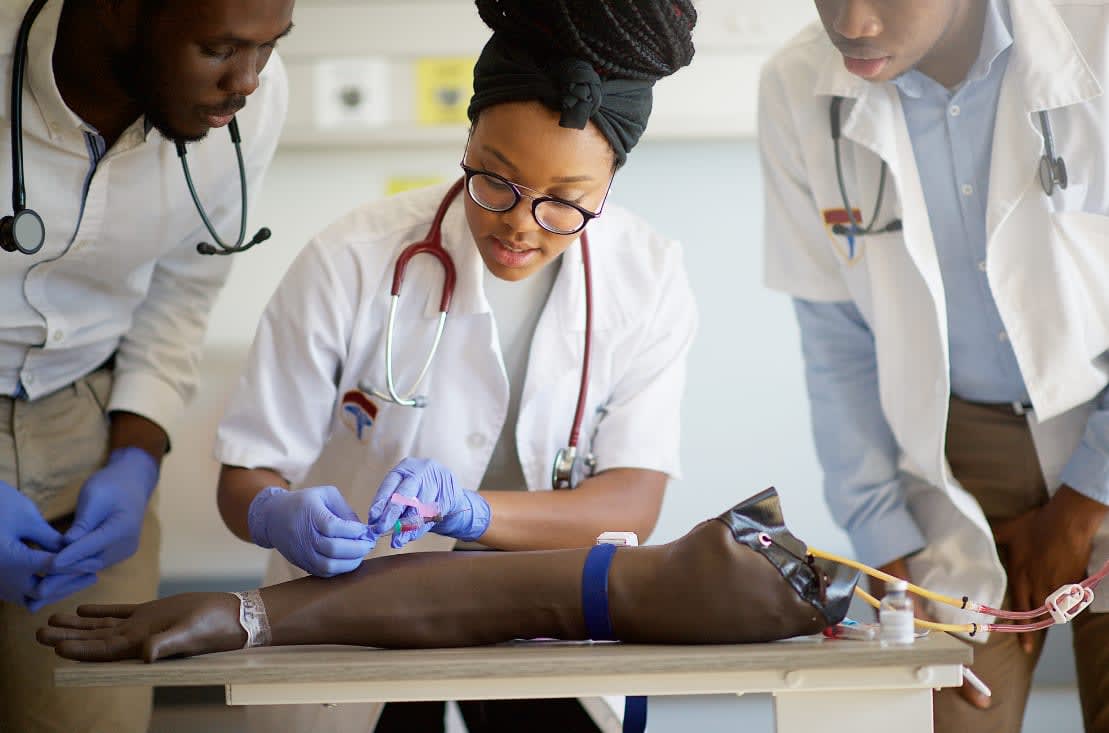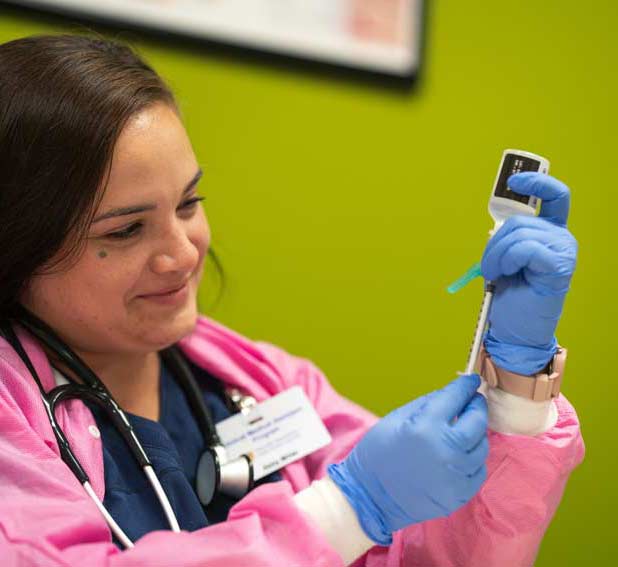The Course to Certification: Understanding the Phlebotomy Training Program Journey and Its Value
As you take into consideration the course to certification in phlebotomy, it is very important to recognize the role you'll play in healthcare. Your training will certainly cover essential abilities, from blood collection techniques to patient interaction. Each part of the program prepares you for the challenges ahead. What precisely does the journey entail, and why is qualification so important for your future occupation? Let's explore these questions further.

The Function of Phlebotomists in Healthcare
Phlebotomists play an important duty in the health care system, acting as the vital link in between individuals and vital diagnostic screening. You'll perform blood attracts, guaranteeing examples are collected properly and safely. Your competence helps in detecting medical problems, keeping track of wellness, and directing therapy choices.
In your everyday communications, you'll need to develop count on with people, making them feel comfortable throughout what may be a difficult experience. You are accountable for identifying and handling examples meticulously to stop contamination or mistakes, which can affect examination outcomes.
Beyond this, you'll frequently work along with doctors and nurses, connecting essential information about patients' conditions. By mastering your abilities, you add meaningfully to individual treatment, making you an indispensable component of the medical group.
Review of Phlebotomy Training Programs
When exploring phlebotomy training programs, you'll find various kinds made to fit various timetables and finding out designs. Each program assists you develop important skills like blood collection and client interaction. Understanding these alternatives is vital to selecting the ideal path for your career.
Kinds of Educating Programs
A number of kinds of training programs are available for those looking to come to be skillful in phlebotomy. You can pick from certificate programs, which generally last a couple of months and concentrate on crucial skills. There are additionally diploma programs that provide a more comprehensive education and learning, usually lasting as much as a year. If you're looking for a much deeper understanding, an associate degree in a related field may be the appropriate fit. On the internet courses supply versatility for those stabilizing work or household commitments, permitting you to examine at your own speed. Additionally, some hospitals and centers offer on-the-job training programs, giving useful experience while you find out. Whatever path you pick, each program aims to outfit you with the required abilities for a successful phlebotomy occupation.

Trick Abilities Developed
Mastering phlebotomy needs a set of crucial abilities that are created via thorough training programs. You'll learn technical skills like correct vein choice, needle insertion, and blood collection techniques. These hands-on methods ensure you can carry out procedures safely and efficiently. Additionally, communication abilities are essential; you'll need to engage with individuals, describe procedures, and put them comfortable. Understanding anatomy and physiology is essential, also, as it assists you find veins and understand the body's feedback to blood attracts. You'll gain knowledge of safety and security procedures and infection control, guaranteeing you maintain a clean and sterile atmosphere. Each of these skills is vital for your success as a qualified phlebotomist, making you a valuable asset in any kind of health care setting.
Secret Components of a Phlebotomy Training Course
In a phlebotomy course, you'll concentrate on important subjects that lay the groundwork for your future occupation. You'll engage in hands-on training that enables you to use what you've found out in real-world setups. Both the core curriculum and useful experience are vital for your success as a phlebotomist.
Core Curriculum Overview
While going after a phlebotomy training program, you'll encounter a core educational program developed to outfit you with fundamental skills and understanding. Phlebotomy school. This educational program generally consists of makeup and physiology, concentrating on the circulatory system and recognizing blood elements. You'll additionally find out about different kinds of blood collection approaches, consisting of venipuncture and capillary puncture techniques
Furthermore, infection control and security methods are essential components, ensuring you understand exactly how to preserve a clean and sterile setting. You'll research patient communication, emphasizing interaction and empathy, which are crucial for relieving individual stress and anxiety. Honest and lawful factors to consider will be dealt with, preparing you for real-world obligations. This foundational knowledge will enable you to succeed as a phlebotomist and provide top quality treatment in scientific setups.
Hands-On Training Experience
Obtaining hands-on experience is an essential component of your phlebotomy training course. This sensible training enables you to use what have a peek here you've found out in a real-world setup, improving your abilities and confidence. Phlebotomy school.
Additionally, you'll obtain the chance to engage with clients, which is essential for establishing your interaction skills. This mix of technological proficiency and social abilities is vital for your success as a qualified phlebotomist. Ultimately, hands-on training is where theory fulfills practice, strengthening your expertise and readiness for accreditation.
Qualification and Licensing Requirements
Before you can begin your job in phlebotomy, it is vital to comprehend the certification and licensing requirements that vary by state. A lot of states require phlebotomists to hold a qualification from a recognized organization, such as the National Phlebotomy Association or the American Society for Clinical Pathology. These accreditations typically involve passing an examination that checks your expertise and abilities in the area.
In addition to certification, some states have particular licensing demands. You might require to complete a certain number of hours in clinical practice, send proof of training, or go through a history check. It is crucial to investigate your state's laws to ensure you visit this page satisfy all essential requirements.
Staying notified regarding these demands not only assists you safeguard a placement yet additionally improves your reputation as a specialist. By meeting these needs, you'll be well on your means to an effective profession in phlebotomy.
Hands-On Training and Practical Experience
Hands-on training and useful experience are vital elements of your phlebotomy education, as they permit you to apply theoretical expertise in real-world situations. Throughout your training, you'll take part in supervised venipuncture, discover appropriate strategies, and come to be familiar with various blood collection equipment. This direct participation is important for developing your confidence and honing your abilities.
You'll work closely with seasoned experts who can lead you with the nuances of person communication and sample handling. Each session not only reinforces your understanding but additionally prepares you for the hectic environment of medical care settings.
In addition, numerous programs incorporate scientific turnings, enabling you to experience varied settings, from medical facilities to outpatient clinics. This exposure aids you adapt to various difficulties and person requirements, ensuring you're well-prepared for your future function. Embrace these chances, as they're necessary to coming to be a proficient and compassionate phlebotomist.
Difficulties Encountered During Training
While gaining hands-on experience is crucial, it's important to recognize the challenges that can arise during your phlebotomy training. In addition, understanding the skills needed for blood attracts takes practice; you may struggle with method originally.
Time monitoring can also be a hurdle, as harmonizing theory, practical sessions, and personal commitments can feel intimidating. You may face varying learning speeds among your peers, causing sensations of insecurity if you assume you're dropping behind. Lastly, adjusting to the different characters of trainers can be challenging, as each may have an one-of-a-kind teaching design.
Recognizing these obstacles early can prepare you for success and help you create strength throughout your training trip.
Career Opportunities After Qualification

As you obtain experience, you may even take into consideration focusing on areas like pediatric or geriatric phlebotomy, dealing pop over to these guys with particular patient requirements. Some phlebotomists choose to advance their jobs by becoming research laboratory service technicians or seeking additional education and learning in health care areas.
Additionally, your accreditation can bring about roles in training or managing new phlebotomists, permitting you to share your knowledge. With the healthcare market continually growing, your abilities will certainly always remain in demand, leading the way for a secure and fulfilling occupation. Welcome the opportunities awaiting you!
Regularly Asked Inquiries
What Is the Regular Period of a Phlebotomy Training Program?
Phlebotomy training programs normally last around four to 8 weeks. You'll participate in hands-on technique, class guideline, and on the internet knowing. Finishing this training prepares you for certification and a satisfying profession in healthcare.
Are Online Phlebotomy Courses Available?
Yes, on-line phlebotomy courses are available. They provide flexibility and convenience, enabling you to study at your own speed. Simply validate the program is certified to satisfy qualification demands and acquire beneficial skills for your profession.
Just How Much Does Phlebotomy Training Generally Expense?
Phlebotomy training typically costs in between $700 and $2,500, depending on the program and location. You need to consider factors like program size, consisted of products, and hands-on experience when picking the best training for you.
What Are Typical Prerequisites for Phlebotomy Training?
Typical requirements for phlebotomy training usually consist of a secondary school diploma or GED, booster shots, and a history check. Some programs might additionally require standard health care understanding or accreditations, ensuring you're planned for hands-on training.
Can I Work While Finishing My Phlebotomy Training?
Yes, you can work while completing your phlebotomy training. Lots of pupils equilibrium jobs with their research studies, however make sure to handle your time properly to assure you satisfy both work and training dedications effectively.